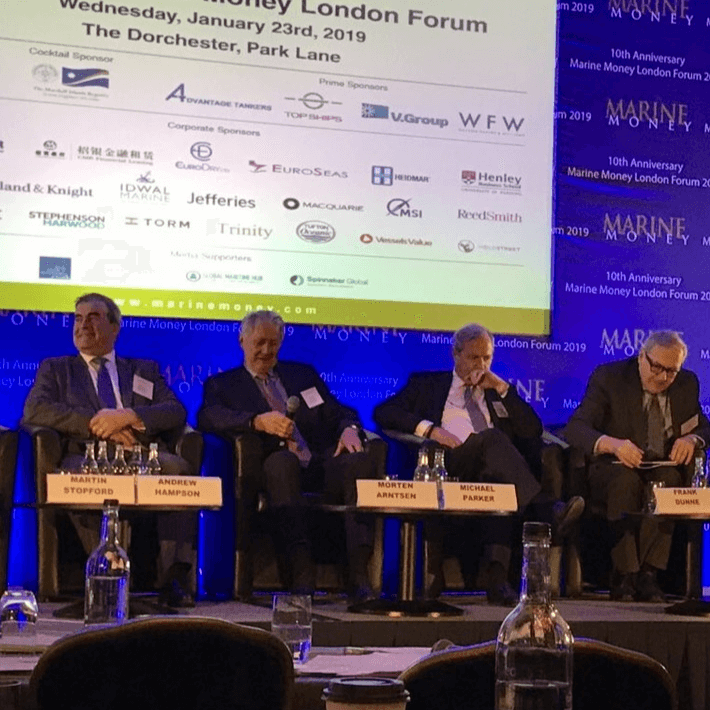Changing Course
Share this blog
Latest Maritime Vacancies
Global HR Director – Europe
Claims & Insurance Manager (Part-time) – London
Legal Counsel (Marine Operations) – London
Insurance Executive – Singapore
Operational and Commercial Pricing Analyst- London
Thoughts from Marine Money

Thoughts from Marine Money, London – January 2019 – Jon Chaplin
Hats off to Marine Money for yet another Ba-Ba-Boosh day of chat and networking in London this week. Conference organisers must know they are winning when 500 people are still in the room at 5pm, including no fewer than three TradeWinds journalists with their professional photographer Kenny Hickey in tow. Now that’s commitment!
Though uncomfortably male and pale, the final panel was thoroughly engaging – a good-natured romp through moderator Martin (Stopford’s) consciousness, dropping in on topics as diverse as industry disrupters, ESG and corporate governance, decarbonization, scrubbers how to make shipping less ‘invisible’ in the public eye and how to attract youngsters to a career in shipping.
Marine Money’s ever-ebullient Chairman, Jim Lawrence shared a thought-provoking comment made to him by Interntanko’s Kathy Stanzel over coffee, one that would prick up the ears of any recruiter: “There are kids in 2nd Grade who are going to do jobs that don’t even exist today.”
At times when it seemed the vast collective wisdom and intellect of the panel might push the discussion beyond the cognitive reach of the audience, the oh-so-grounded Frank Dunne would interject with the precision you would expect from the world’s top ship finance lawyer. Are you confused about what constitutes a ‘disrupter’ in shipping? Don’t be. “It will be rules: rules are the disrupters.”
Talking about whether ship owners could be relied upon to design and pay for the next generation of enviro-friendly ships, Morten Arntzen was characteristically candid. What we need to remember (he urged a room full of shipping bankers) is that for the “last 10 years, the shipping industry has not earned its cost of capital.”
Arntzen has little time for scrubbers, or indeed their financiers: “Guys writing green loans for scrubbers that dump stuff in the water are not going to be the heroes.” On the subject of safety at sea, he was convinced that the last 30 years had seen a transformation: “We should all applaud ourselves; we have done a phenomenal job.” Mini fist pumps all round!
It fell to Tufton Oceanic’s MD Andrew Hampson to raise the topic of ESG, a subject very close to his heart and high on the agendas of his investors. Citigroup’s Global Head Shipping Michael Parker flagged up the vast sums available for investment in ESG projects – up to $2bn “right now”. Michael Webber’s now famous reports on corporate governance were cited as an important milestone in cleaning up. (Though I would also mention Eric Martin’s excellent articles in TradeWinds during the Autumn of 2014).
Hampson was clear: “lack of transparency and bad governance” are the reasons the industry needs overhaul. Artzen was able to cite figures from a study which seemed to prove that shipping companies with good corporate governance deliver better returns for investors over time.
The session concluded introspectively, with the panel pondering whether shipping will be ‘Amazoned’ out of business, simply becoming a function of the global supply chain. Will any of us be playing the same role in a future vision of shipping? “I’m sure the lawyers will be” quipped Hampson under his breath.
Well done to Mia, Kevin et al at Marine Money.
Jon Chaplin, Director, Executive Search, Spinnaker Global